Must-Have AI Tools for Sales Productivity in 2026
In this blog, we will cover how AI is transforming sales productivity and explore the must-have AI tools you need to take your team’s performance to the next level.
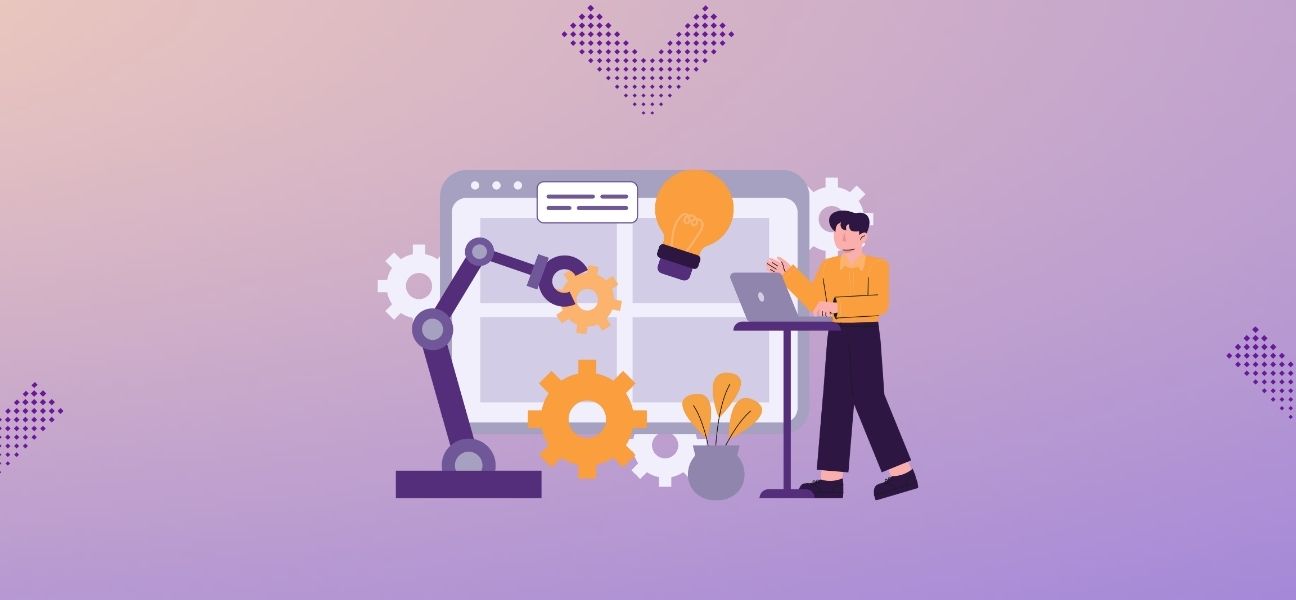
Are you tired of watching your sales team struggle with time-consuming tasks that don't directly contribute to closing deals? It's frustrating to see sales engineers and reps buried in busy work, especially when their expertise could drive more value to the business. Sales professionals often spend up to 40% of their time on administrative tasks, limiting their ability to focus on actual selling.
The solution? Artificial Intelligence (AI). AI tools are significantly improving sales productivity, and these tools are only going to get smarter in the future. In this blog, we will cover how AI is transforming sales productivity and explore the must-have AI tools you need to take your team’s performance to the next level.
Key Takeaways
- Sales productivity refers to how efficiently teams close deals, engage prospects, and hit targets by automating tasks like lead generation and proposal creation.
- AI tools boost sales productivity by automating repetitive tasks, improving decision-making, and allowing sales teams to focus on high-value activities.
- Top AI tools like Inventive AI, Gong.io, and Fireflies.ai improve efficiency in areas such as proposal automation, conversation analytics, and meeting transcription.
- Key features to look for in AI sales tools include automation accuracy, seamless integration, real-time insights, collaboration features, and customer personalization.
- Inventive AI offers 10x faster proposal generation, 95% accuracy, and 50% higher win rates, making it the best tool for sales teams looking to automate and enhance their proposal workflows.
What is Sales Productivity?
Sales productivity refers to how efficiently your sales teams can close deals, engage with prospects, and hit their targets. It’s about getting the most out of your team’s time by automating repetitive tasks, minimizing bottlenecks, and making sure your team can focus on building relationships and closing sales.
Sales productivity covers multiple factors:
- Lead Generation: How efficiently sales reps generate and qualify leads.
- Proposal Creation: Time spent creating high-quality, customized proposals.
- Customer Interaction: The quality of engagement with leads and customers.
- Pipeline Management: Effectively tracking and nurturing leads through the sales funnel.
In essence, increasing sales productivity means doing more with less: less time, less manual effort, and less stress. Enter AI, the perfect solution to make this a reality.
Also Read: Top 25 RFP Software in 2025: Which to Use?
How AI Helps Boost Sales Productivity
AI tools are designed to simplify and automate processes that traditionally took up a lot of time. Here’s how they help sales teams work smarter, not harder.
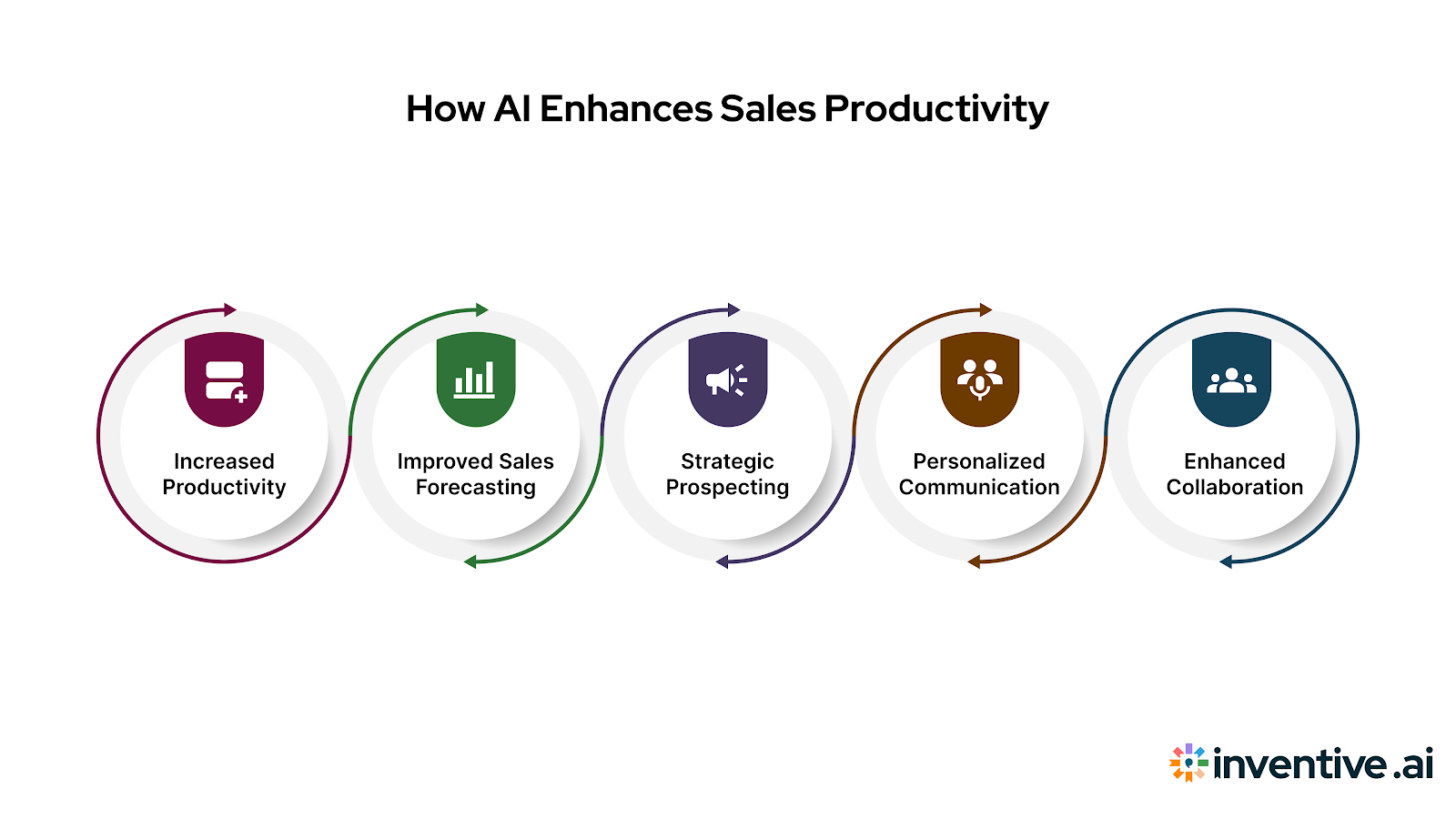
1. Increased Productivity
AI-driven automation reduces the time your team spends on repetitive tasks, such as data entry and proposal generation. By automating these time-consuming tasks, AI allows your team to focus on higher-value activities such as strategy development, solution design, and cultivating customer relationships.
2. Improved Sales Forecasting
AI uses past data and predictive insights to generate more accurate sales forecasts. This helps your team make better, data-driven decisions, plan effectively for the future, and allocate resources more efficiently, ensuring your sales efforts are always aligned with the best opportunities.
3. Strategic Prospecting
AI tools analyze customer data and behavior patterns, helping identify leads that are most likely to convert. By prioritizing high-potential prospects, AI allows your sales team to focus their time and efforts on the most valuable opportunities, increasing their chances of closing deals.
4. Personalized Communication
AI tools enable sales teams to send tailored messages based on customer behavior and preferences. This level of personalization ensures that each communication feels relevant and meaningful to the customer, which ultimately boosts engagement, improves customer satisfaction, and increases the likelihood of conversion.
5. Enhanced Collaboration
AI tools facilitate better collaboration across teams by providing features like shared dashboards, real-time updates, and seamless communication between sales reps, proposal managers, and solution architects. With everything aligned and updated in real-time, your team can work more efficiently, ensuring a smooth and well-managed proposal process.
AI is transforming sales productivity by automating the mundane, providing deep insights, and allowing your team to focus on the most impactful tasks. Embrace these tools, and you’ll see significant improvements in both sales performance and team satisfaction.
Top AI Tools for Sales Productivity
Now that we’ve covered how AI can boost sales productivity, let’s dive into the top 10 AI tools for 2026. These tools are specifically designed to improve efficiency, accuracy, and collaboration across the sales cycle.
Inventive AI
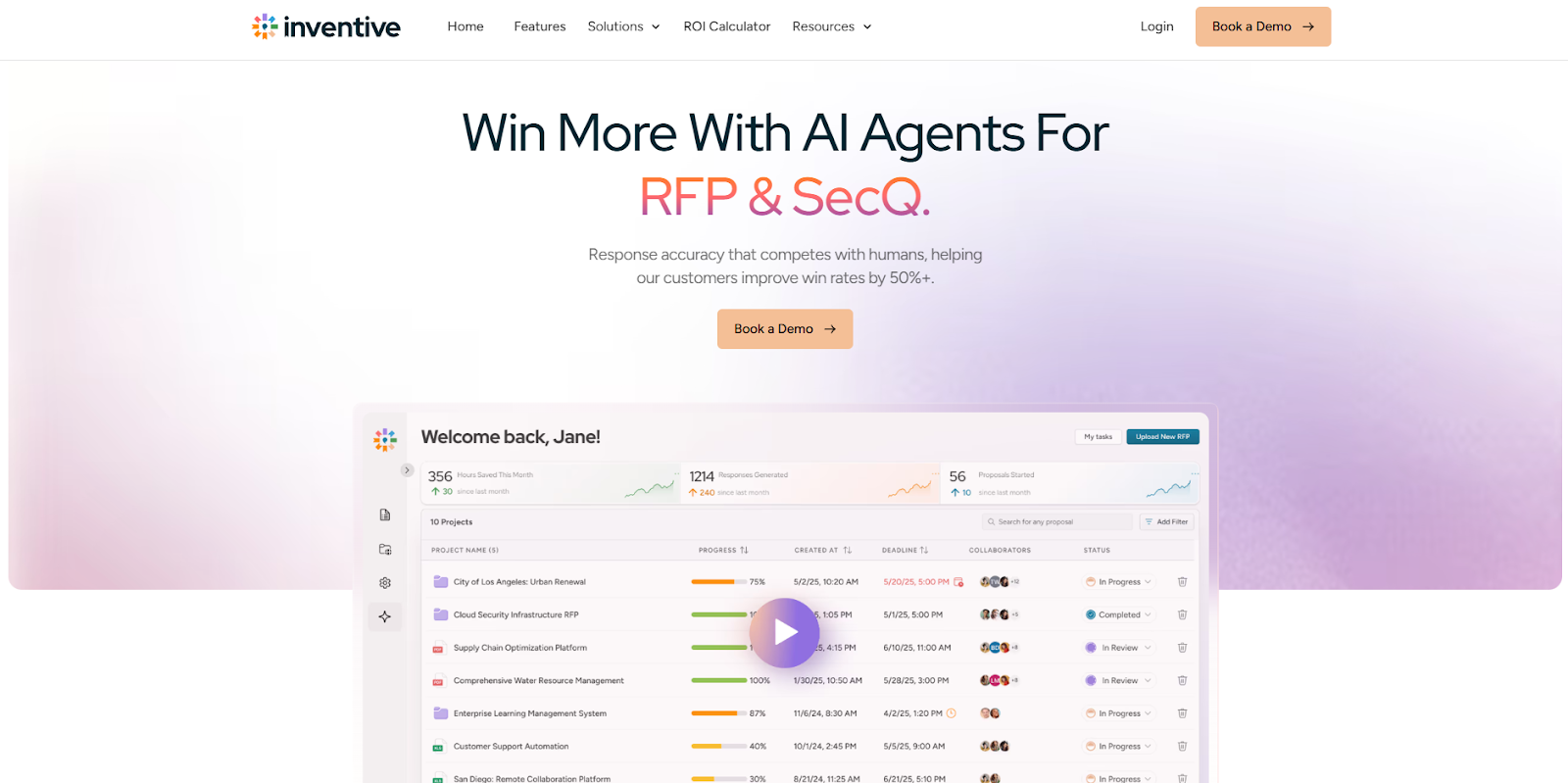
Sales teams often struggle with the inefficiencies of manual proposal creation and content management. Inventive AI’s AI-powered RFP Response Software addresses this by automating the proposal process, enabling teams to generate first-draft responses 90% faster with 95% accuracy. By automatically curating and managing content, it ensures that only the most relevant, up-to-date information is included in RFP responses. This reduces the time spent on repetitive tasks while also improving proposal quality and consistency, leading to higher win rates and more productive sales cycles.
Features:
- AI-Driven Proposal Generation: Automatically creates customized RFP responses, eliminating manual entry.
- Content Management: Ensures the use of the latest and most accurate information by integrating with your internal document storage and CRM systems.
- Smooth Integrations: Works well with Google Drive, SharePoint, CRM systems, and other tools for smooth workflow integration.
- Real-Time Collaboration: Lets multiple team members collaborate in real-time, improving efficiency and speed.
Pros:
- Reduces RFP response time by 90%.
- AI-powered content management ensures the use of fresh and accurate information.
- Seamless integration with major tools like Google Drive, SharePoint, and CRMs.
- Increases win rates by 50% through faster and more accurate proposal submissions.
Cons:
- Limited analytics to provide real-time data.
Best For:
- Sales Teams: Ideal for teams that handle complex RFPs and need to respond faster and more accurately.
- Proposal Managers: Perfect for managing high volumes of proposals and improving submission speed.
- Teams Using Integrated Tools: Works well for teams using tools like Google Drive, SharePoint, and CRMs, offering seamless integration.
Gartner Rating: 5/5
Inventive AI is the best solution for sales teams looking to automate and accelerate their proposal workflow, offering unmatched speed, accuracy, and integration.
Gong.io
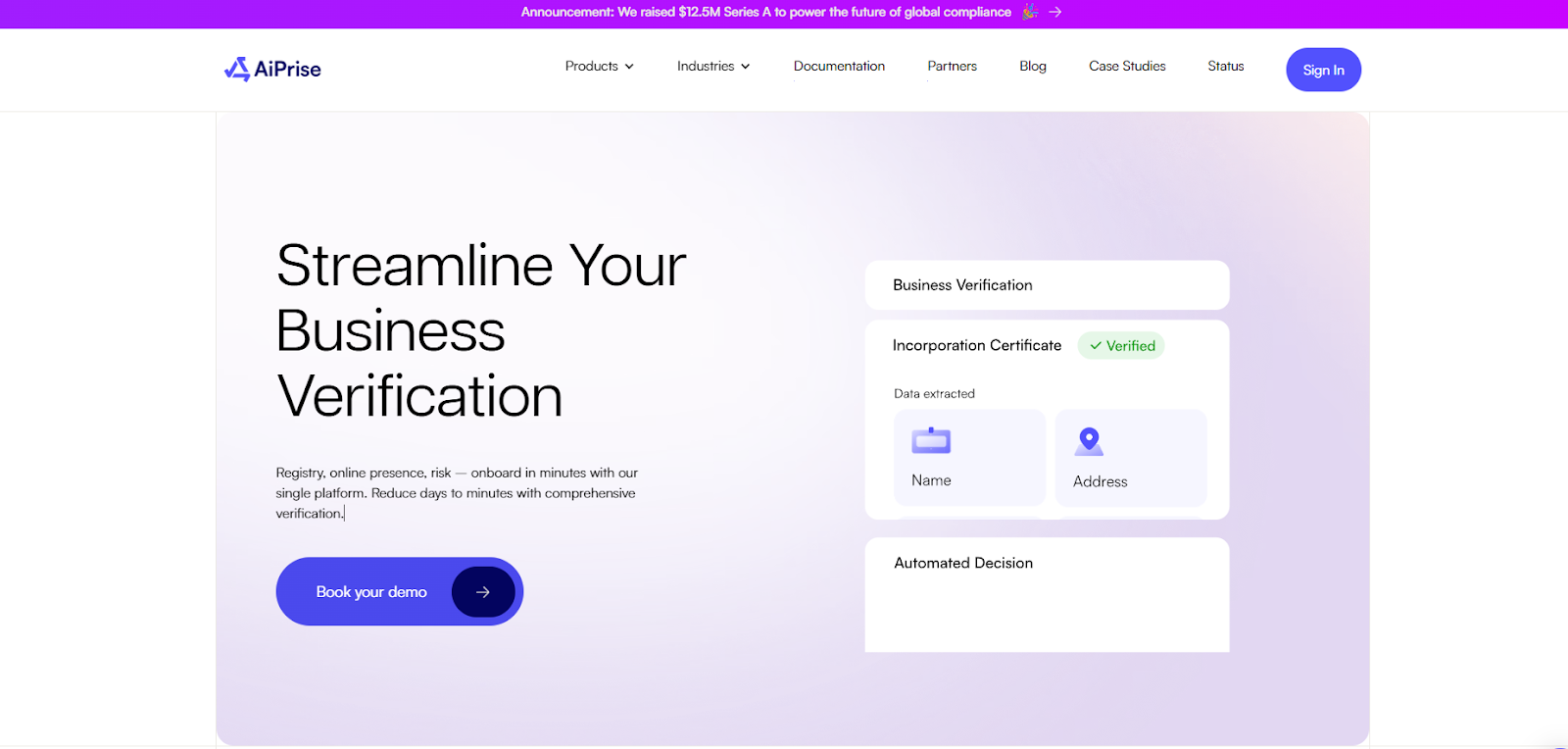
Gong.io provides conversation intelligence, analyzing sales calls to uncover key insights that drive better sales strategies. By tracking customer conversations, Gong helps sales teams identify buying signals, optimize communication, and improve deal-closing strategies.
Features:
- Conversation Analytics: Analyzes sales calls to uncover buying signals and insights.
- CRM Integration: Syncs with major CRM platforms to offer real-time visibility of customer interactions.
Pros:
- Tracks customer conversations to identify key buying signals.
- Integrates with CRMs for enhanced visibility into customer interactions.
Cons:
- Limited to conversation analysis, lacking RFP automation.
- Doesn’t handle proposal management or generation.
- Expensive, especially for small businesses.
- Learning curve can be steep for new users.
Gartner Rating: 4.7/5
Gong.io excels in conversation intelligence but falls short in providing the RFP automation and proposal management necessary for comprehensive RevOps support.
Fireflies.ai

Fireflies.ai transcribes meetings in real-time, offering sales teams the ability to access meeting summaries and key points easily. This AI-driven transcription tool ensures that no important conversation is missed and provides a clear record for follow-up actions.
Features:
- Real-Time Transcription: Transcribes meetings and calls in real-time, capturing every word.
- Meeting Summaries: Creates summaries of meetings, highlighting key points for quick access.
Pros:
- Accurate transcription of meetings and calls.
- Smooth integration with conferencing tools like Zoom, Google Meet, and more.
Cons:
- Lacks sales intelligence capabilities like lead scoring or AI-powered proposal generation.
- Doesn’t integrate with RFP tools.
- Limited customization options for transcription summaries.
- Lacks deep sales workflow integration.
Gartner Rating: Not Found
Fireflies.ai is great for transcribing meetings but lacks the broader capabilities needed to streamline sales processes like proposal automation or lead management.
Gamma.app
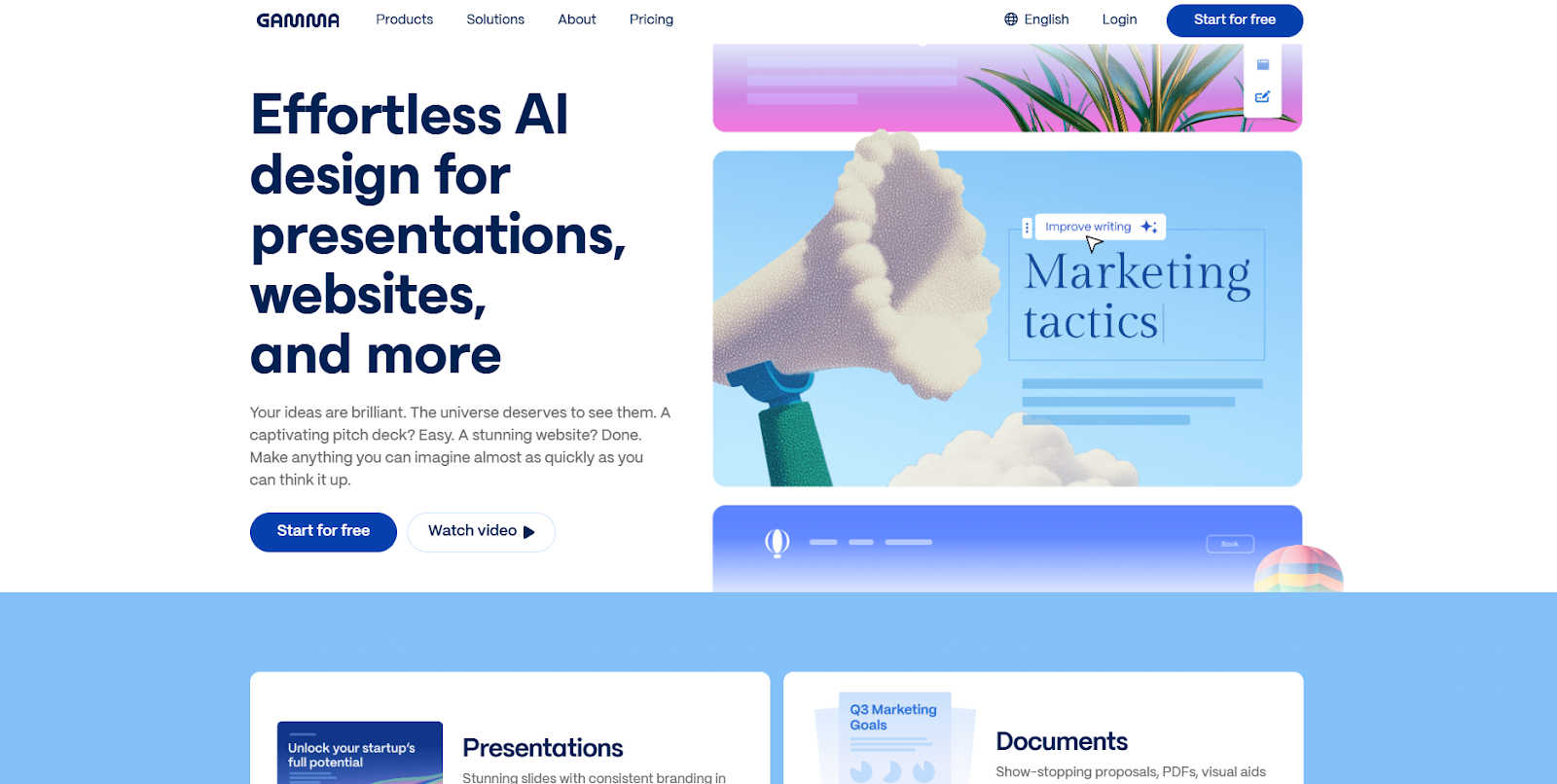
Gamma.app is an AI-powered presentation tool that enables sales teams to quickly create visually engaging slides for pitches, proposals, and other sales collateral. It helps transform complex ideas into compelling visual narratives, reducing the time spent on manual presentation creation.
Features:
- AI-Powered Slide Creation: Quickly generates presentation slides with visually appealing designs.
- Real-Time Collaboration: Enables teams to work on presentations together in real-time.
Pros:
- Speeds up presentation creation with visually appealing outputs.
- Great for on-the-fly presentations, saving time during sales meetings.
Cons:
- Limited to presentations; doesn’t support proposal management or broader sales workflows.
- No integration with CRM or RFP tools.
- Lacks customization options for presentations.
- Pricing can be high for small teams.
Gartner Rating: Not Found
Gamma.app is ideal for creating quick, engaging presentations but doesn’t offer the comprehensive tools needed for proposal management or sales workflows.
Lavender
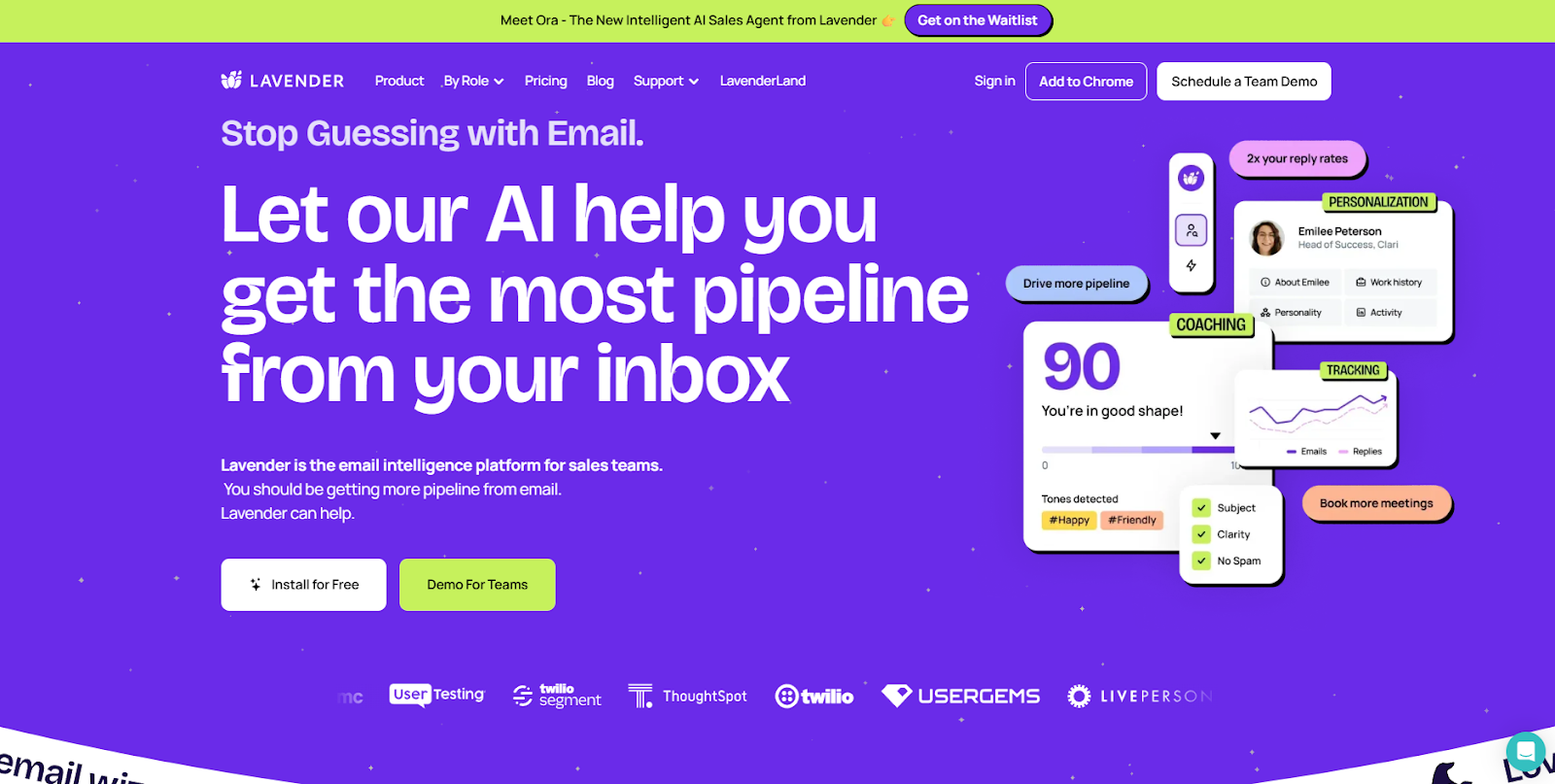
Lavender uses AI to optimize sales emails, providing real-time feedback on tone, engagement, and personalization. It helps sales reps write better emails faster by ensuring their messages are effective and aligned with the customer’s needs.
Features:
- Email Optimization: Provides real-time suggestions on tone, engagement, and personalization.
- Email Tracking: Tracks email responses to help sales teams engage at the right time.
Pros:
- Helps sales reps write better emails faster, increasing engagement.
- Real-time feedback on tone and structure ensures more personalized outreach.
Cons:
- Focused only on email optimization, no capabilities for proposal or content management.
- Doesn’t integrate with RFP systems or handle technical documentation.
- Limited functionality without premium subscription.
Gartner Rating: Not Found
Lavender is an excellent tool for optimizing email outreach but doesn’t provide support for broader sales workflows or proposal automation.
Clari
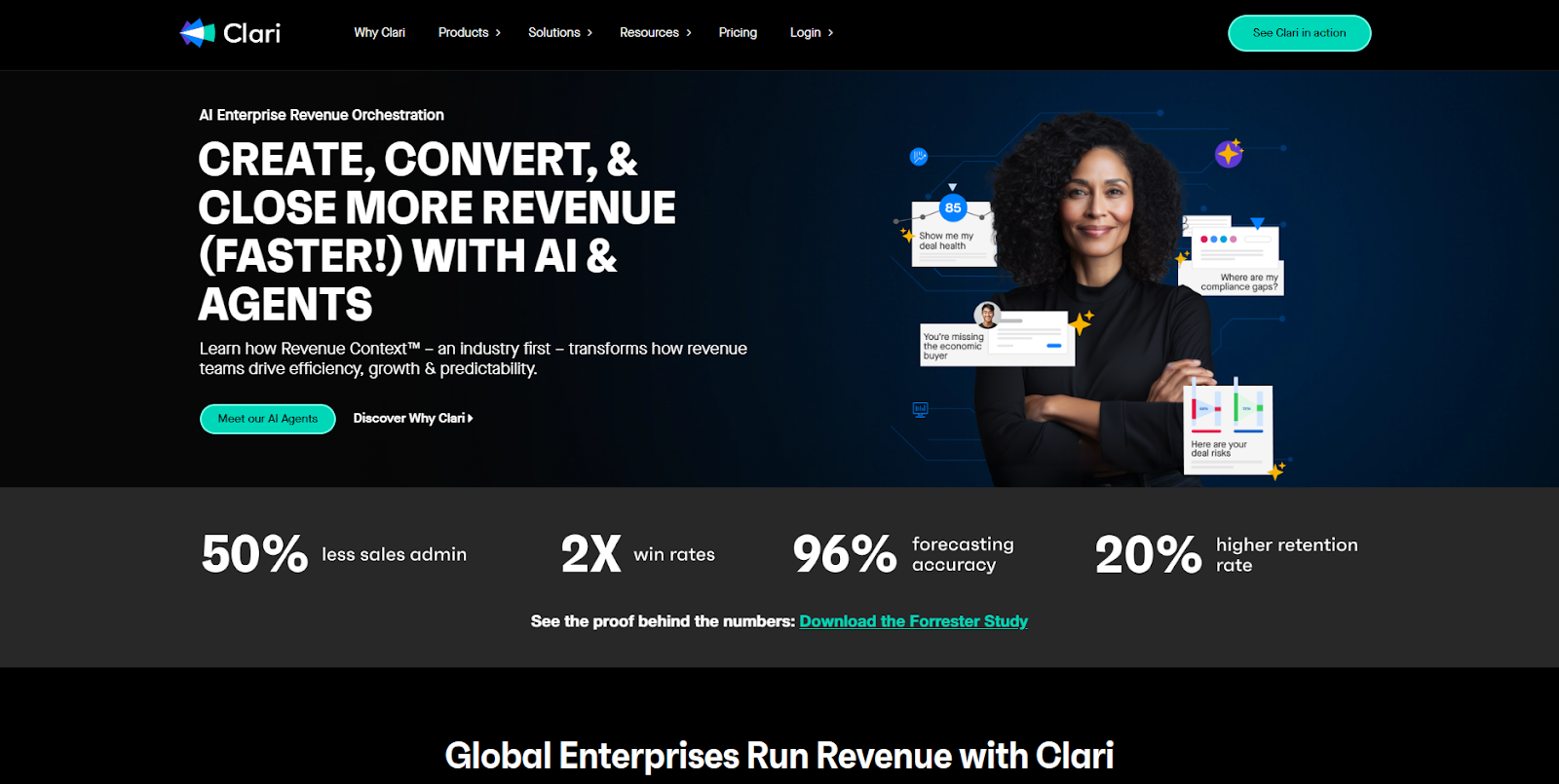
Clari offers sales forecasting and pipeline management tools, helping sales managers track and predict revenue more accurately. Its AI-powered analytics allow teams to make data-driven decisions and stay on top of their sales pipeline.
Features:
- Sales Forecasting: Uses AI to predict sales outcomes based on historical and current data.
- Pipeline Management: Helps sales teams track the status of deals in real-time.
Pros:
- AI-powered forecasting for accurate revenue predictions.
- Pipeline management capabilities help track deal status.
Cons:
- Complex setup process that can take time to implement.
- Expensive, particularly for small teams.
- Lacks proposal generation capabilities.
- Doesn’t provide insights into customer conversations.
Gartner Rating: 4.4/5
Clari is perfect for managing pipelines and forecasting sales, but it doesn’t offer the proposal automation needed to complete the full sales cycle.
HubSpot
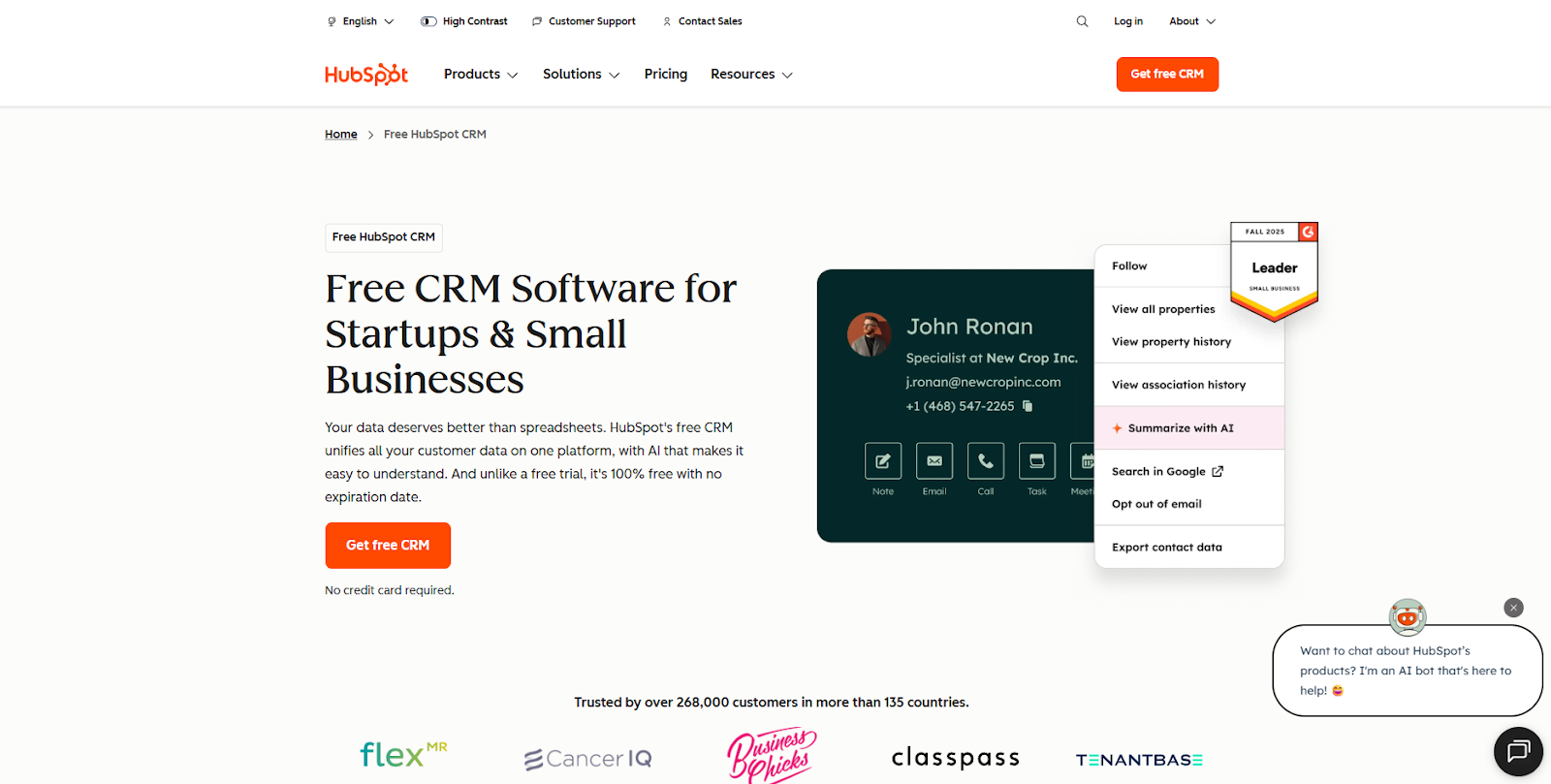
HubSpot is a comprehensive CRM and sales automation platform that helps businesses attract, engage, and delight customers. Its AI-powered tools automate a wide range of tasks, making it a popular choice for sales teams.
Features:
- CRM Automation: Automates lead nurturing, follow-ups, and engagement.
- Sales Pipeline Management: Provides visibility into every stage of the sales cycle.
Pros:
- Great for integrating sales and marketing efforts.
- Easy-to-use interface, suitable for teams of all sizes.
Cons:
- Limited functionality without premium features.
- Integration limitations with non-HubSpot tools.
- Basic reporting and analytics without the advanced features of other tools.
- Pricing can increase significantly as you scale.
Gartner Rating: 4.4/5
HubSpot is a solid CRM tool that integrates well with marketing, but its proposal and sales automation capabilities are limited unless you upgrade to premium features.
Cognism
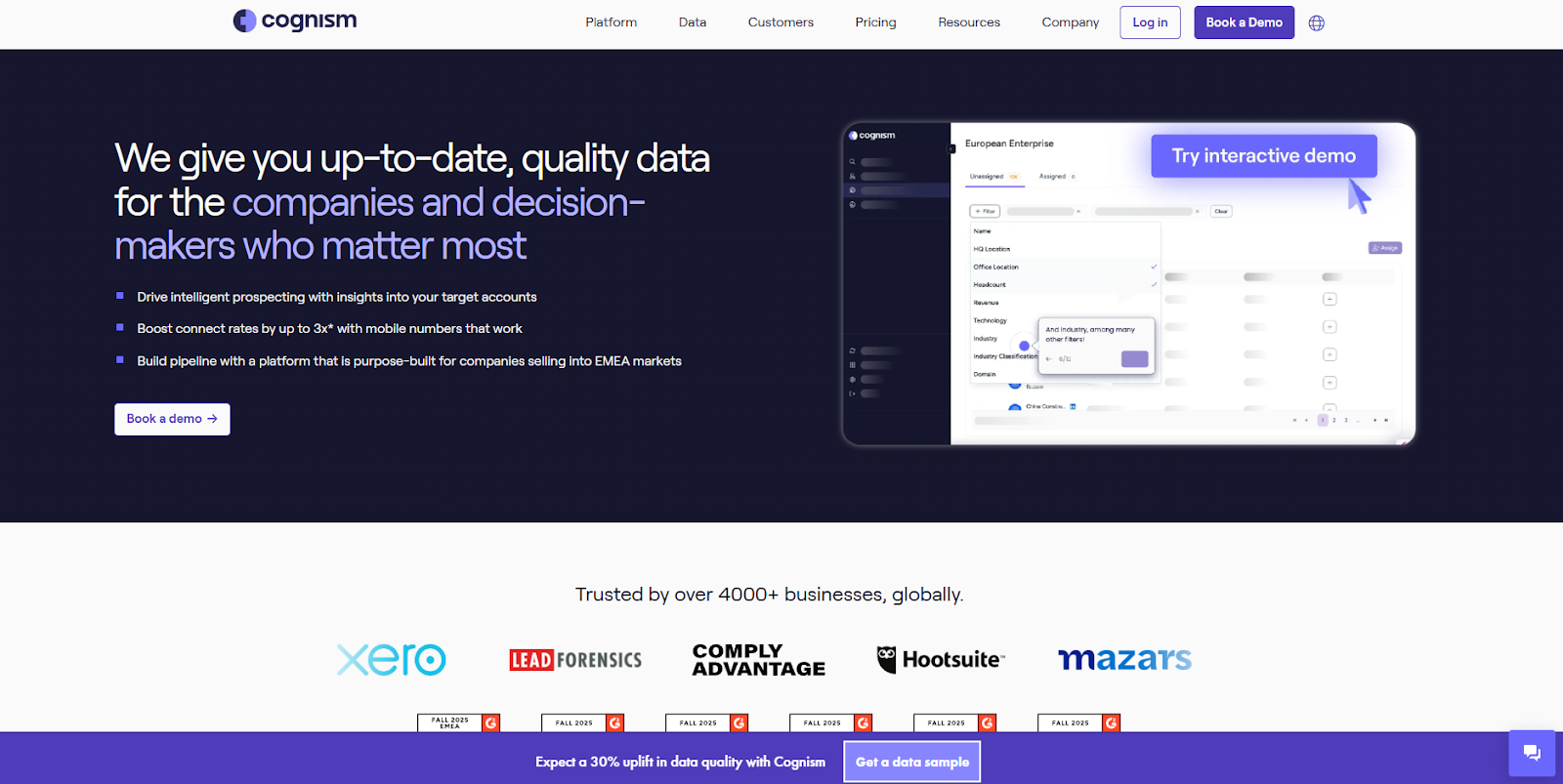
Cognism is an AI-driven lead generation platform that helps sales teams find high-quality prospects. By using data it provides accurate contact information and insights into lead intent, making it easier to identify potential customers.
Features:
- Data-Driven Lead Generation: Uses AI to provide accurate, actionable lead data.
- Intent Data: Tracks prospect behavior to identify strong leads.
Pros:
- Accurate lead data for targeted outreach.
- Intent-based lead scoring ensures you focus on high-potential prospects.
Cons:
- Limited to lead generation; doesn’t manage proposals or sales workflows.
- Data can be inaccurate at times.
- Doesn’t integrate well with other sales tools.
- Lacks comprehensive sales cycle management.
Gartner Rating: 4.4/5
Cognism is an excellent tool for lead generation, but lacks the broader sales tools necessary for full sales productivity.
Apollo.ai
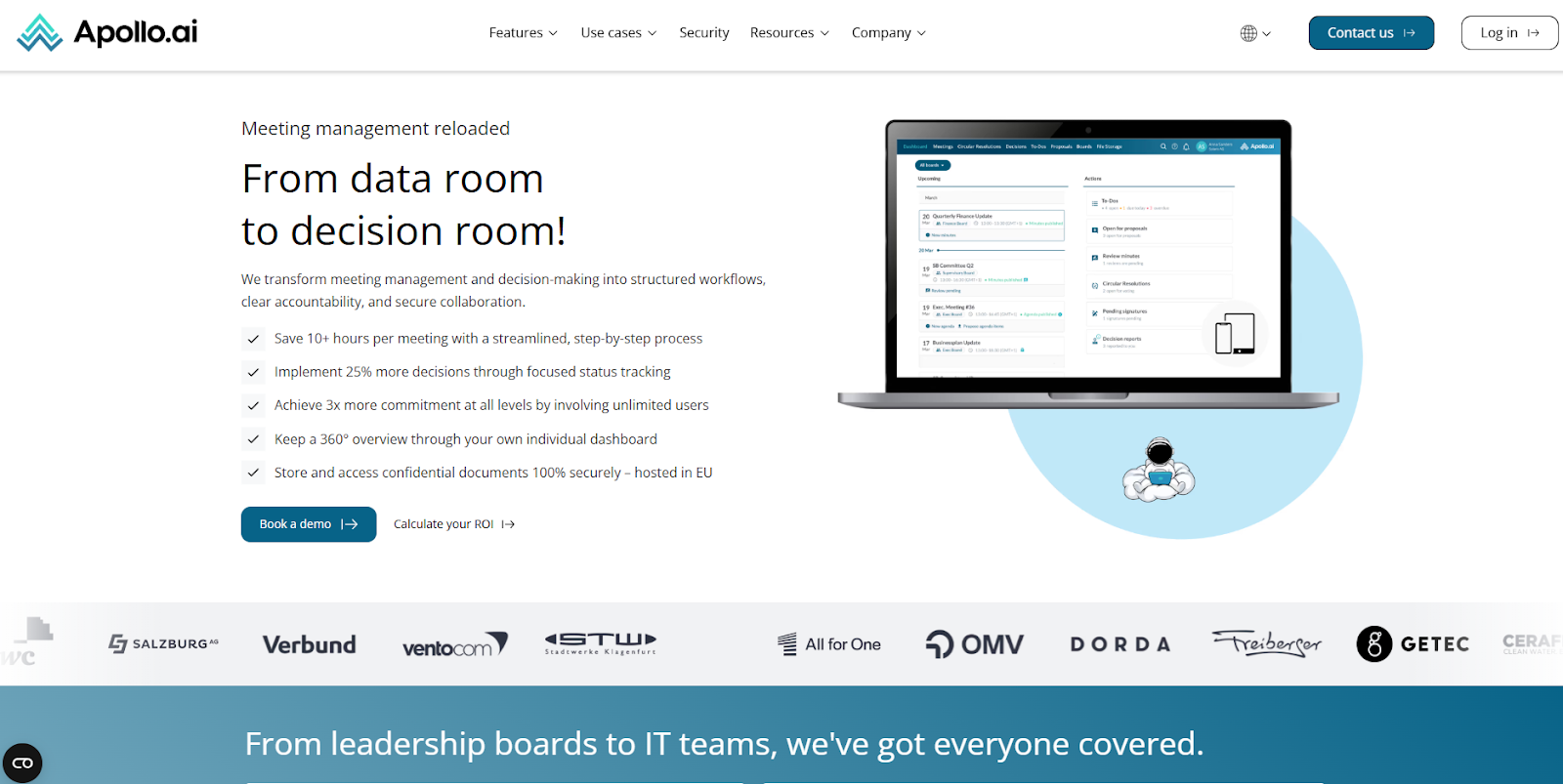
Apollo.ai uses artificial intelligence to automate prospecting, lead scoring, and account-based marketing. It helps sales teams find the right leads at the right time, improving conversion rates.
Features:
- Prospecting Automation: Automatically finds and scores leads based on AI algorithms.
- Account-Based Marketing: Targets the right accounts for a personalized outreach.
Pros:
- Efficient lead prospecting using AI.
- Account-based marketing features for targeting specific prospects.
Cons:
- Limited reporting capabilities compared to other tools.
- Integration challenges with certain CRM systems.
- Can be overwhelming for small sales teams.
- Pricing may be prohibitive for startups.
Gartner Rating: 4/5
Apollo.ai is a powerful tool for prospecting but may not be suitable for smaller teams due to integration challenges and its pricing model.
Outreach

Outreach is a sales engagement platform that automates email sequences, tracks interactions, and improves engagement. It helps sales teams stay connected with prospects while optimizing their outreach efforts.
Features:
- Sales Engagement Automation: Automates email sequences and tracks prospect interactions.
- CRM Integration: Syncs with major CRM platforms for seamless sales workflow.
Pros:
- Optimizes outreach through automation.
- Provides detailed tracking of sales activities.
Cons:
- Expensive, making it a challenge for small teams to justify.
- Steep learning curve for new users.
- Basic analytics and reporting.
- Limited customization options.
Gartner Rating: 4.4/5
Outreach is a great tool for sales teams focused on email outreach automation but comes at a high price with a steep learning curve.
While each of these AI tools offers unique strengths, Inventive AI stands out as the top choice for sales teams seeking to streamline proposal generation, enhance accuracy, and drastically reduce response times, ultimately driving higher win rates and boosting overall sales productivity.
Also Read: How to Write a Sales Proposal Template That Drives More Wins
How to Choose the Right AI Tool for Your Business?
When selecting the ideal AI tool for your sales team, there are key features you should prioritize to ensure you’re choosing the right solution:
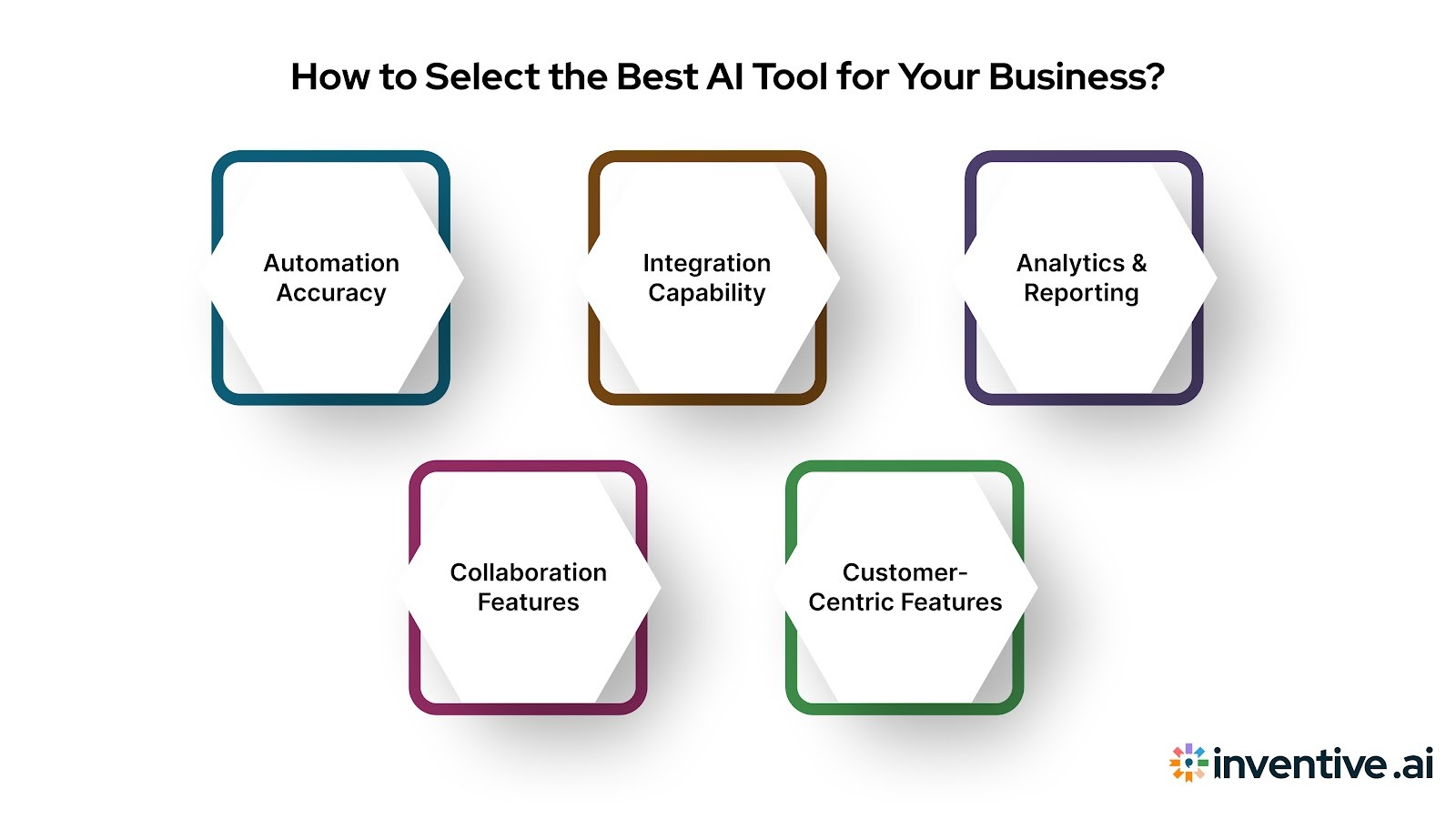
1. Automation Accuracy
The tool should generate precise and reliable outputs, significantly reducing errors and enhancing overall efficiency. With accurate automation, your team can focus on what truly matters, closing deals and nurturing relationships.
2. Integration Capability
Look for a tool that seamlessly integrates with your existing CRM, communication platforms, and other sales tools. Integration helps improve workflow, reduces manual input, and ensures that your team can access all the information they need from a single source.
3. Analytics & Reporting
Real-time insights and reporting capabilities are essential for refining sales strategies. With a tool that provides actionable metrics, your sales team can adjust their approach quickly, spot trends, and make data-driven decisions to improve performance.
4. Collaboration Features
Choose a tool that fosters collaboration across teams. Sales, marketing, and other departments must work together effectively to create cohesive strategies. The right AI tool will make it easy for everyone to collaborate, align on goals, and streamline the proposal generation process.
5. Customer-Centric Features
AI tools focused on customer insights, personalization, and engagement can greatly enhance your sales efforts. By understanding customer preferences and needs, your sales team can deliver tailored proposals and messages that resonate with your audience.
All of these key features are available in Inventive AI, providing a comprehensive solution for your sales team to enhance productivity, streamline workflows, and ultimately increase win rates.
Challenges in AI Integration for Sales Productivity
AI has the potential to greatly improve sales productivity, but integrating it into your sales processes can come with its own set of challenges. These obstacles can slow down or even prevent the successful adoption of AI tools.
Here, we’ll discuss the common challenges organizations face when using AI for sales and how to overcome them.
1. Data Quality and Consistency Issues
AI models rely heavily on accurate, high-quality data to generate useful insights and recommendations. However, many organizations struggle with inconsistent, incomplete, or outdated data across various systems, making it difficult for AI to function effectively.
Solution: To ensure AI systems work as intended, businesses must invest in cleaning, organizing, and standardizing their data before implementation. Implementing data governance policies and ensuring data consistency across CRM systems, sales platforms, and marketing tools is essential for AI tools to function optimally.
2. Resistance to Change and User Adoption
Sales teams, accustomed to traditional methods, may resist adopting AI-driven solutions due to fear of technology disruption, lack of familiarity, or uncertainty about how AI will impact their daily roles. This can lead to slow adoption and limited utilization of AI tools.
Solution: Encouraging a culture of innovation and providing training on how AI can save time and improve productivity helps ease this transition. Getting sales teams involved early and showing them the benefits will help with adoption.
3. Integration with Existing Tools and Systems
Integrating AI tools with existing sales systems, such as CRM platforms, proposal management tools, and communication channels, can be technically complex and resource-intensive. Incompatible tools or insufficient integration can lead to inefficient workflows and fragmented data.
Solution: Choose AI tools that easily integrate with your current tech stack. This ensures smooth workflows and allows AI tools to access accurate, real-time data, improving their performance.
4. High Initial Costs and ROI Uncertainty
The upfront investment required to implement AI solutions can be a barrier, especially for small and mid-sized companies. In addition, the ROI of AI tools may not be immediately apparent, leading to hesitation about committing resources to such technologies.
Solution: Start with AI tools that deliver value in high-impact areas like proposal automation or lead scoring. Track the results over time to show the return on investment, proving that AI can help save time and boost sales.
While integrating AI into sales processes comes with challenges, they are manageable with the right approach. By focusing on data quality, getting buy-in from your team, ensuring smooth integration with existing systems, and carefully managing costs, businesses can overcome these barriers.
The payoff is a significant boost in sales productivity, improved decision-making, and more efficient workflows. With the right strategy, AI can help your sales team perform at its best.
Why Inventive AI Leads the Way in Sales Productivity
When it comes to boosting sales productivity and revolutionizing RFP workflows, Inventive AI is in a class of its own. As the most advanced AI-powered RFP automation platform, it simplifies proposal generation, content management, and team collaboration, all while dramatically speeding up the entire process.
Why is Inventive AI the Best for Sales Teams in 2026?
- 10x Faster Proposal Generation: Inventive AI empowers your team to produce high-quality, customized proposals 90% faster than traditional methods, eliminating time-consuming manual work and allowing your sales team to focus on what matters most, engaging with prospects and closing deals.
- 95% Accuracy and Zero Hallucination: With its precision-driven AI, Inventive AI ensures that every proposal is not only fast but also highly accurate, maintaining the integrity of your messaging and ensuring no mistakes in content, even as it pulls information from various sources.
- Real-Time Collaboration: Sales teams can work together seamlessly on proposals, as Inventive AI enables real-time collaboration, so multiple team members can simultaneously contribute and refine proposals with up-to-date information.
- Smooth Integration: Whether it’s integrating with your CRM, Google Drive, or SharePoint, Inventive AI syncs effortlessly with the tools you already use, making the transition into AI-powered automation smooth and efficient.
By automating repetitive tasks and optimizing the entire proposal process, Inventive AI allows sales teams to save valuable time, improve accuracy, and ultimately close more deals with ease.
Want to see how Inventive AI transforms sales productivity?
Frequently Asked Questions (FAQs)
1. How to use AI in sales?
AI tools automate repetitive tasks, streamline sales workflows, and analyze data to provide actionable insights that support smarter decision-making. By handling time-consuming processes like lead scoring, follow-ups, and data entry, AI frees up sales teams to focus on high-priority tasks, ultimately helping them work more efficiently and close more deals.
2. Is AI beneficial for sales teams?
Yes, AI significantly boosts sales team performance by automating tasks such as lead generation, proposal creation, and email outreach. It also offers valuable insights for better decision-making, helping teams prioritize their efforts on high-value opportunities. By reducing manual work, AI enables sales reps to increase productivity, improve customer interactions, and drive revenue growth.
3. Which is the best AI tool for sales productivity?
Inventive AI is the top choice for enhancing sales productivity. It offers a 10x faster proposal generation process with 95% accuracy, reducing response times and boosting win rates by up to 50%. By automating proposal workflows and ensuring content relevance, Inventive AI allows sales teams to focus on engaging with prospects and closing deals more effectively.
4. What features should I look for in AI-powered sales tools?
When choosing AI tools for your sales team, look for features that ensure automation accuracy, seamless integration with existing CRM and sales platforms, real-time analytics, and collaborative tools that improve team alignment. Additionally, tools that provide customer insights, personalization, and easy access to data will enhance your team's ability to close more deals and drive greater customer satisfaction.
5. Can AI help improve lead scoring and forecasting?
Yes, AI is highly effective at improving lead scoring and sales forecasting. By analyzing past data and customer behavior patterns, AI tools help prioritize high-potential leads, enabling your team to focus on the most promising opportunities. AI also enhances forecasting accuracy, providing more reliable sales predictions and helping your team make data-driven decisions for better resource allocation and strategy development.

90% Faster RFPs. 50% More Wins. Watch a 2-Minute Demo.
Knowing that complex B2B software often gets lost in jargon, Hardi focuses on translating the technical power of Inventive AI into clear, human stories. As a Sr. Content Writer, she turns intricate RFP workflows into practical guides, believing that the best content educates first and earns trust by helping real buyers solve real problems.
After witnessing the gap between generic AI models and the high precision required for business proposals, Gaurav co-founded Inventive AI to bring true intelligence to the RFP process. An IIT Roorkee graduate with deep expertise in building Large Language Models (LLMs), he focuses on ensuring product teams spend less time on repetitive technical questionnaires and more time on innovation.


